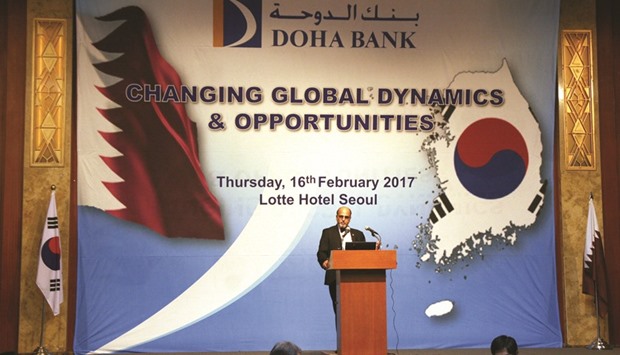Business
Diversification key to Qatar-S Korea alliances: Doha Bank CEO
Diversification key to Qatar-S Korea alliances: Doha Bank CEO
February 18, 2017 | 11:44 PM


New avenues on diversification in the GCC could lead to more strategic alliances between Qatar and South Korea, Doha Bank CEO Dr R Seetharaman has said.Seetharaman made the statement during a knowledge sharing session hosted by Doha Bank titled ‘Changing Global Dynamics and Opportunities’ held recently in Seoul.Highlighting opportunities from diversification efforts in the GCC region, Seetharaman said Qatar’s budget in 2017 allocated “nearly 44% of the total expenditure” for key sectors like health (12.3%), education (10.4%), and infrastructure (21.2%).He said the government would sign contracts for new projects worth QR46.1bn in 2017 related to 2022 FIFA World Cup, infrastructure and transportation, health, and education.Seetharaman said Saudi Arabia would spend QR268bn on its National Transformation Plan through 2020, of which QR42bn is allocated for 2017, while Dubai’s 2017 budget will see spending on infrastructure rise by 27% as Dubai continues to launch development projects ahead of its hosting of the World Expo 2020.“The above developments reveal GCC and South Korea can explore new avenues on account of diversification. It would also lead to more strategic alliances between Qatar and South Korea,” Seetharaman said.On Qatar-South Korea bilateral relationships, Seetharaman said: “Korea was importing one third of its annual LNG requirements and 10% of its oil from Qatar. Kogas, one of the world’s biggest LNG buyers has a standing agreement with Rasgas for 7mn tonnes a year until 2024-2026. “This was increased to 9mn tonnes based on an agreement entered in 2012. Korean imports from Qatar are mainly oil and gas, while exports from Korea are mostly heavy equipment, passenger cars, transformers, and air conditioning units.” He said many Korean construction companies have participated in various infrastructure projects such as Lusail Expressway, Umm Haul Power and desalination plants. Many Korean companies are looking for mutually-beneficial projects related to 2022 World Cup, he noted. Seetharaman said Qatar and South Korea are expanding relations from energy and infrastructure cooperation to healthcare and education. He said the two countries signed an MoU for cooperation in science and technology and research and development, including an MoU on educational cooperation in 2015.On the South Korea and Qatar economy, Seetharaman said: “South Korean economy is expected to grow by 2.6% in 2017. Exports, which account for about half of the export-driven economy, are expected to rebound this year. Last month, South Korea’s central bank kept interest rates unchanged at a record low of 1.25%. Qatar economy is expected to grow by 3.4% in 2017. “The Qatar budget for 2017 has estimated revenues of QR170.1bn and an expenditure of QR198.4bn thus, expecting to post a deficit of QR28.3bn. The shortfall is expected to be covered by issuing debt instruments in the local and international financial markets, while maintaining its reserves and investments. ”Seetharaman also spoke on GCC-South Korea bilateral relationships: “GCC-South Korea bilateral trade is close to $57bn in 2016. South Korea imports 30% of its crude oil from Saudi Arabia, which is also Korea’s sixth-biggest trading partner globally and its top trading partner in the Middle East.
February 18, 2017 | 11:44 PM
